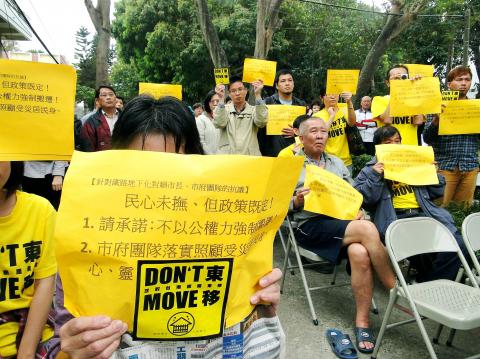Greater Tainan residents affected by a project to move a railway underground yesterday protested a government decision to expropriate their land and houses for the project, accusing Greater Tainan Mayor William Lai (賴清德) of lying when he said that they had changed their minds after talks with the city government.
“I’m an architect, I built my house more than 50 years ago and have lived here most of my life, and now the government wants to tear it down and take my land, despite my objection,” 85-year-old resident Chen Ko (陳割) told a press conference in Taipei. “Mayor Lai claims to be open-minded and willing to listen to the people, but he never came to talk with us before making the decision, and he leaves us with no choice.”
Chen’s wife, Tsai Hsin-mei (蔡信美), agreed.

Photo: Hung Jui-chin, Taipei Times
Tsai said most of the more than 400 households who face forced expropriation support the project to move the railroad underground and are willing to sacrifice their own interests for the public good, but they oppose the Greater Tainan Government’s decision on Monday to permanently expropriate their properties.
“We are willing to make some sacrifices, to have our houses demolished to make way for temporary tracks as the construction is in progress, as long as the city government removes the tracks and returns the land to us after it has been completed,” Tsai said. “Lai lied when he told the [Greater Tainan] City Council on Monday that he has negotiated with us and that we changed our minds and now support the Executive Yuan’s version of the project.”
According to the Executive Yuan’s design, houses on the east side of the current tracks would be demolished to make way for new underground tracks. When the project is completed, the original surface tracks are to be removed to make way for a park and a commercial district.
Wang Wei-min (王偉民), a senior civil engineer, made a presentation at the press conference of an alternative plan that he and his team have proposed that would only “borrow” land from residents during the construction phase.
“What I have done is prove that another option is feasible from a professional’s point of view. I made the same presentation to [Greater Tainan] officials, but they simply ignored it,” Wang said.
Chang Hui-chin (張惠津), another resident affected by the proposal, was worried about what would happen to her after her house has been flattened.
“I am old, I don’t know how to drive it’s convenient for me to live in the center of the city, because I can go to the bank, the post office or the market on foot,” Chang said. “The [Greater Tainan] government said that they will build new apartments for us outside the city and sell them to us at a discounted price — but will I be able to go to the bank, the post office or the market if the new apartments are in the middle of nowhere?”
Resident Wang Chin-luan (王金鑾) said her family has worked hard for decades to pay off the mortgage on the house where they are currently living.
“Now the [Greater Tainan] government wants us to buy a new apartment, which means I would have the burden of debts on new loans,” Wang said.

Chinese spouse and influencer Guan Guan’s (關關) residency permit has been revoked for repeatedly posting pro-China videos that threaten national security, the National Immigration Agency confirmed today. Guan Guan has said many controversial statements in her videos posted to Douyin (抖音), including “the red flag will soon be painted all over Taiwan” and “Taiwan is an inseparable part of China,” and expressing hope for expedited reunification. The agency last year received multiple reports alleging that Guan Guan had advocated for armed reunification. After verifying the reports, the agency last month issued a notice requiring her to appear and explain her actions. Guan

GIVE AND TAKE: Blood demand continues to rise each year, while fewer young donors are available due to the nation’s falling birthrate, a doctor said Blood donors can redeem points earned from donations to obtain limited edition Formosan black bear travel mugs, the Kaohsiung Blood Center said yesterday, as it announced a goal of stocking 20,000 units of blood prior to the Lunar New Year. The last month of the lunar year is National Blood Donation Month, when local centers seek to stockpile blood for use during the Lunar New Year holiday. The blood demand in southern Taiwan — including Tainan and Kaohsiung, as well as Chiayi, Pingtung, Penghu and Taitung counties — is about 2,000 units per day, the center said. The donation campaign aims to boost

The Kaohsiung Tourism Bureau audited six hotels in an effort to prevent price gouging ahead of Korean band BTS’ concert tour in the city scheduled for Nov. 19, 21 and 22 this year. The bureau on Friday said that the audits — conducted in response to allegations of unfair pricing posted on social media — found no wrongdoing. These establishments included the local branches of Chateau de Chine, Hotel Nikko, My Humble House, and Grand Hai Lai, it said, adding that the Consumer Protection Commission would have penalized price gougers had the accusations been substantiated. The bureau said the Tourism Development Act

The Central Weather Administration (CWA) said a magnitude 4.9 earthquake that struck off the coast of eastern Taiwan yesterday was an independent event and part of a stress-adjustment process. The earthquake occurred at 4:47pm, with its epicenter at sea about 45.4km south of Yilan County Hall at a depth of 5.9km, the CWA said. The quake's intensity, which gauges the actual effects of a temblor, was highest in several townships in Yilan and neighboring Hualien County, where it measured 4 on Taiwan's seven-tier intensity scale, the CWA said. Lin Po-yu (林柏佑), a division chief at the CWA's Seismological Center, told a news conference